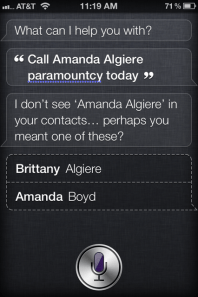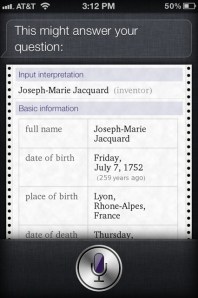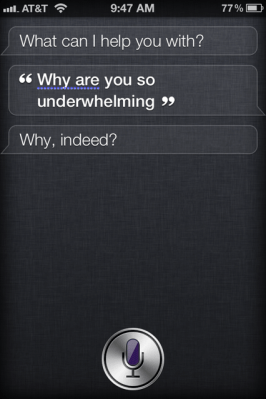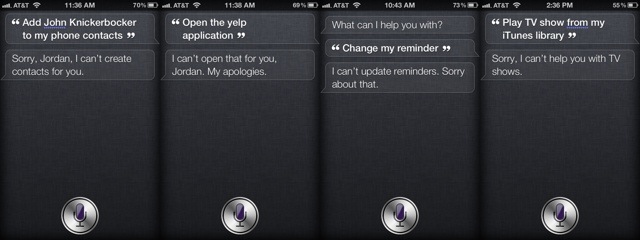When Apple first unveiled the iPhone 4S, there was one feature that left every jaw in the room on the floor. Her name is Siri. Scott Forstall demoed the personal assistant at Apple’s media event, and the entire presentation went off without a hitch. Then, as expected, Apple released their commercials, which were equally impressive. In short, everyone and their brother was amped for Siri.
Then the iPhone 4S was released. Save for some battery life issues and my own mini-rant on Siri’s gender and humility, there really weren’t many complaints. Now, however, I find myself more bothered by my own expectations than anything else.
Why? Because Siri isn’t perfect, and perfect is what I expected.
Let me pause right here to say a few things: First, I realize that my complaining about Siri’s limitations is a strictly “first world” problem. Secondly, this post shouldn’t be taken as a poor review of Siri. Sure, she has shortcomings, and like just about any app or software feature, she makes mistakes. But I love her, and I can safely say that won’t change. In fact, I use Siri as much as possible, which is kind of the problem.
The disappointment can all be traced back to the hype, which began with Apple’s demo. I don’t blame Apple for this — I guess it’s just a product of success — but with each new capability introduced, hope grew. If she can create reminders, she can edit them, right? Wrong. If she has access to the weather app, calendar app, clock, text, music, and the list goes on, she should have no trouble adding a contact to my phone, right? Wrong. If she can tell me the weather, she should be able to add a new location to my weather app, right? Wrong. What about playing TV shows? She’s already hooked up to iTunes, so she’ll surely play an episode of Friends for me, right? Nope, still wrong. OK fine, but Yelp… Yelp is baked right into Siri, so she has to at least be able to launch the app on my phone… right?
Wrong, wrong, wrong.
But Apple never said she’d be able to do that. And Siri is still in beta, technically, so there’s a good chance that she’ll be able to do much more in the coming months. But that doesn’t change my disappointment. Siri gave me hope — a feeling that we were truly jumping into the future, where a voice on a mobile computer could help me in almost any way. Not that it’s Siri’s fault, but this just isn’t the case.
Then, the commercials aired. Seeing that guy send and receive texts while he jogs and plays his music hands-free… Sold. I mean if he’s outside (near the waterfront, no less), on a jog, on his headphones, and Siri can understand everything he’s saying, then the voice recognition must be top-notch, right? Well, not wrong, but not right either.
Siri misunderstands me all the time. Maybe I mumble, or maybe it’s because I’m talking to her like I would talk to any human personal assistant. (That is, if I were ever powerful enough to have one.) But that’s what Apple promised right? Forstall said in the demo that it’s not about the words, it’s about the meaning. I should be able to ask about the weather in whatever way I’d like, but the more creative I get, the less intuitive Siri becomes. When asked, “Should an umbrella be a part of my outfit today?” Siri responded by saying, “Call Amanda Algiere paramountcy today.”
 In a way, this is still an intuitive response. She couldn’t understand me, so she took to problem solving. I have a Brittany Algiere and an Amanda Boyd in my phone, so Siri pulled from that in her answer. Then again, she thought she heard me say “paramountcy,” too. In any case, I didn’t get the answer I was looking for. Whatever happened to “it just works?”
In a way, this is still an intuitive response. She couldn’t understand me, so she took to problem solving. I have a Brittany Algiere and an Amanda Boyd in my phone, so Siri pulled from that in her answer. Then again, she thought she heard me say “paramountcy,” too. In any case, I didn’t get the answer I was looking for. Whatever happened to “it just works?”
Then, there’s the issue of efficiency. One of the big capabilities of Siri is her ability to read and transcribe texts and emails. It sounds basic, but messaging is one of the primary uses of any phone, so getting these things done hands-free is a huge deal. But I noticed two things about her text transcription.
The first is that I can type faster than Siri transcribes in almost any case. I can also read faster than I can be read to — by Siri or a human makes no difference. Maybe I’m just totally awesome and text-obsessed, but I’m thinking this holds true for most people. The second thing I noticed loops back to miscommunication and misunderstanding. The whole point of using Siri to send a text is because either my hands are full, or I’m in a rush and need to get that text on its way now. If Siri misunderstands me the first time around — even if she gets it right on the second try — it’s slower than if I had typed the message myself. More than once, I’ve stood outside a train station while I was late waiting for Siri to get it right. It’s a total bummer to say the least.
Past that, we then have to account for Siri’s use of the network. Siri doesn’t work without a connection, plain and simple. But when do I need her most? When I’m out and about, on the move, and need my hands for what I’m doing. It’s on the move that your network connection, in general, is roughest. In other words, Siri fails most when you need her the most. Which sucks.
These are Siri’s shortcomings, but I can accept them. In fact, I welcome them, as long as Siri keeps setting reminders for me. As I’ve tried to state numerous times throughout the post, I love Siri, and she’s only going to get better and better. If you really think about it, the possibilities with Siri are endless. GigaOm’s John Wilson wrote a great piece on just that, outlining the advancements that could be made to the 911 system and health care in general courtesy of Siri.
 No doubt Apple will push Siri as far as she can possibly go, tapping into a ton of popular apps, and eventually being able to do just about anything. But our current Siri is just a piece of that — incomplete.
No doubt Apple will push Siri as far as she can possibly go, tapping into a ton of popular apps, and eventually being able to do just about anything. But our current Siri is just a piece of that — incomplete.
That’s the thing about the disappointment Siri brings with her — in the end it’s my fault. She’s a direct step into the future, and any one step into the future leads to a thousand more. Just look at Joseph Marie Jacquard’s punched-card power loom. In 1801, way before any form of a computer existed, his system of reading punched cards to perform certain actions laid part of the ground work for binary code, the foundation of computing as we know it today. But no one expected the loom to transcribe texts for them.
Siri is a massive step into the future, and so our hopes and dreams for her are equally larger than life. That said, disappointment is sure to follow. She’s like a birthday party — not quite what you’d hoped for.
Feel free to cry if you want to.

